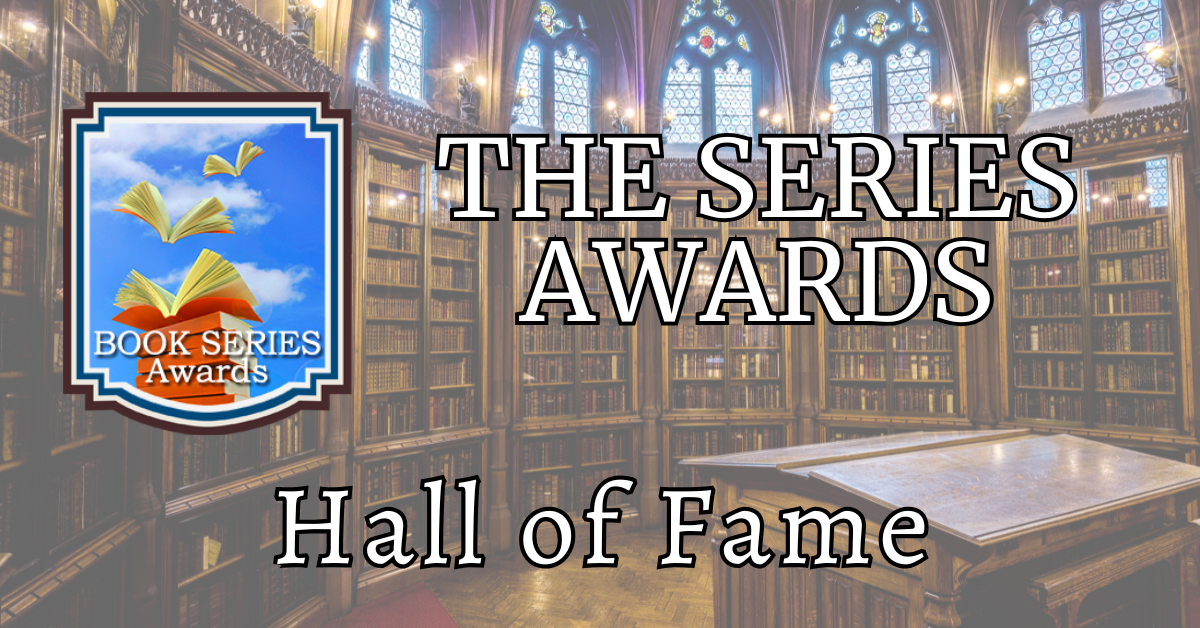
We titled the Chanticleer International Book Awards (CIBAs) division for Pre-1750s Historical Fiction the Chaucer Awards, after the English poet and author of the Canterbury Tales.
Chaucer’s The Canterbury Tales is considered one of the greatest works in the English language. It was among the first non-secular books written in Middle English to be printed.

A woodcut from William Caxton’s second edition 0f the Canterbury Tales printed in 1483
The framing device for the collection of stories is a pilgrimage to the shrine of Thomas à Becket in Canterbury, Kent. The 30 pilgrims who undertake the journey gather at the Tabard Inn in Southwark, across the Thames from London. They agree to engage in a storytelling contest as they travel, and Harry Bailly, host of the Tabard, serves as master of ceremonies for the contest. Most of the pilgrims are introduced by vivid brief sketches in the “General Prologue.” Interspersed between the 24 tales are short dramatic scenes (called links) presenting lively exchanges, usually involving the host and one or more of the pilgrims. Chaucer did not complete the full plan for his book: the return journey from Canterbury is not included, and some of the pilgrims do not tell stories.
The use of a pilgrimage as the framing device enabled Chaucer to bring together people from many walks of life: knight, prioress, monk; merchant, man of law, franklin, scholarly clerk; miller, reeve, pardoner; wife of Bath and many others. The multiplicity of social types, as well as the device of the storytelling contest itself, allowed presentation of a highly varied collection of literary genres: religious legend, courtly romance, racy fabliau, saint’s life, allegorical tale, beast fable, medieval sermon, alchemical account, and, at times, mixtures of these genres.
The stories and links together offer complex depictions of the pilgrims, while, at the same time, the tales present remarkable examples of short narratives in verse, plus two expositions in prose. The pilgrimage, which in medieval practice combined a fundamentally religious purpose with the secular benefit of a spring vacation, made possible extended consideration of the relationship between the pleasures and vices of this world and the spiritual aspirations for the next.
Source: The Brittanica Encyclopedia
The Canterbury Tales consists of the General Prologue that sets the story and 24 tales and ends with “Chaucer’s Retractions” (probably a CYA (cover your a&@) move on his part).
Some interesting tidbits about Geoffrey Chaucer
- born c. 1342/43 probably in London. He died on October 25, 1400
- his father was an important London vintner
- His family’s finances were derived from wine and leather
- Chaucer spoke Middle English and was fluent in French, Latin, and Italian
- He guided diplomatic missions across the continent of Europe for ten years where he discovered the works of Dante, Petrarch, and Boccaccio whose The Decameron had a profound influence on Chaucer’s later works
- He married well as his wife received an annuity from the queen consort of Edward III
- His remains are interred in the Westminster Abbey

Kiffer Brown, the founder of Chanticleer Reviews, was introduced to Geoffrey Chaucer’s Canterbury Tales when she was studying medieval history at university. If you press her on the matter, she will confess that she and her classmates read the work in Old English (of which she is very proud to have done). And yes, she is fond of The Decameron by Boccaccio. Don’t be surprised if one of the next division of the Chanticleer International Book Awards is named after Boccaccio.
The deadline to enter works into the 2019 Chaucer Book Awards, a division of the prestigious CIBAs is June 30th. Click here for more information: https://www.chantireviews.com/services/Historical-Fiction-Contest-p21521105
AND NOW FOR the CHAUCER BOOK AWARD WINNERS HALL OF FAME

The Chaucer Book Awards for Pre-1750s Historical Fiction Hall of Fame First Place and Grand Prize winners!
2018 Chaucer Book Awards for Pre-1750s Historical Fiction First in Category Winners
- Rebels against Tyranny: Civil War in the Crusader States by Helena P. Schrader
- Mistress of Legend Book 3 by Nicole Evelina
- Michael – Book Three of The Triptych Chronicle by Prue Batten
- Pelsaert’s Nightmare by Gregory Hansen
- Under the Approaching Dark by Anna Belfrage
- Stone Circle by Kate Murdoch
- David & Avshalom — Life and Death in the Forest of Angels by Bernard Mann
The 2018 Chaucer Book Awards Grand Prize:
The SERPENT and The EAGLE by Edward Rickford
2017 Chaucer Book Awards for Pre-1750s Historical Fiction First in Category Winners
- The Serpent and the Eagle by Edward Rickford
- Slave to Fortune by DJ Munro
- The Traitor’s Noose by Catherine A Wilson and Catherine T Wilson
- Feast of Sorrow: A Novel of Ancient Rome by Crystal King
- Call to Juno: A Tale of Ancient Rome by Elisabeth Storrs
- The Chatelaine of Montaillou by Susan E Kaberry
- Guillaume: Book Two of The Triptych Chronicle by Prue Batten
The 2017 Chaucer Book Awards Grand Prize:
The Traitor’s Noose: Lions and Lilies Book 4 by Catherine A. Wilson and Catherine T. Wilson
2016 Chaucer Book Awards for Pre-1750s Historical Fiction First in Category Winners
- Envoy of Jerusalem: Balian d’Ibelin and the Third Crusade by Helena P. Schrader
- The Gilded Crown by Catherine T and Catherine A Wilson
- Hope of Ages Past by Bruce Gardner
- 1381: The Forgotten Revolt by Gina M. Bright
- The Serpent’s Crown: A Novel of Medieval Cyprus by Hana Samek Norton
The 2016 Chaucer Book Awards Grand Prize:
The Towers of Tuscany by Carol M. Cram
2015 Chaucer Book Awards for Pre-1750s Historical Fiction First in Category Winners
- Antebellum U.S. History: Jay W. Curry – Nixon and Dovey
- Legacy/Legend: Edmond G. Addeo – Uzumati – A Tale of the Yosemite
- Ancient History: Christian Kachel – Spoils of Olympus: By the Sword
- Middle Ages: Helena Schrader – Defender of Jerusalem
- Middle Ages: Glen Craney –The Spider and the Stone: A Novel of Scotland’s Black Douglas
- Elizabethan/Tudor – Anna Castle – Death by Disputation
-
Women’s History: Paula Butterfield – La Luministe
- Turn of the Century: James Conroyd Martin – The Warsaw Conspiracy
- Young Adult: K.S. Jones – Shadow of the Hawk
- World Wars History: Nicki Chen – Tiger Tail Soup, A Novel of China at War
- World/International History – Robert A. Wright – Valhalla Revealed
The 2015 Chaucer Book Awards Grand Prize:
Valhalla Revealed by Robert A Wright
2014 Chaucer Book Awards for Pre-1750s Historical Fiction First in Category Winners
- Women’s Fiction: J. L. Oakley for Timber Rose
- Legend: Kevin Allen and Emma Rose Millar for Five Guns Blazing
- Legacy: Michael D. McGranahan for Silver Kings and Sons of Bitches
- Pre-History: Mary S. Black for Peyote Fire
- Ancient History: Rebecca Locklann for The Thinara King
- Roman/Grecian Classical: Elisabeth Storrs for The Golden Dice: A Tale of Ancient Rome
- Middle Ages: Helena P. Schrader for St. Louis’ Knight
- Late Middle Ages: Lilian Gafni for The Alhambra Decree: Flower from Castile
- Elizabethan/Tudor: Syril Levin Kline for Shakespeare’s Changeling: A Fault Against the Dead
- The 1600’s: Donna Scott for Shame the Devil (manuscript)
- The 1700s & 1800s: Karleene Morrow for Destinies
- Turn of the 19th Century: Ruth Hull Chatlien for The Ambitious Madame Bonaparte
- Twentieth Century: David Brendan Hopes for The One with the Beautiful Necklaces (manuscript)
- World Wars: Gregory Erich Phillips for The Love of Unfinished Years (manuscript)
- Young Adult: Sharon Short for My One Square Inch of Alaska
- U. S. History: J. P. Kenna for Beyond the Divide
- World History: Michelle Rene for I Once Knew Vincent
The 2014 Chaucer Book Awards Grand Prize:
The Love of Finished Years by Gregory Erich Phillips
2013 Chaucer Book Awards for Pre-1750s Historical Fiction First in Category Winners
- Adventure/Young Adult: I, Walter by Mike Hartner
- N.A. Western: Crossing Purgatory by Gary Schanbacher
- World War II (European): Deal with the Devil by J. Gunner Grey
- Adventure/Romance/YA: “Lady Blade” by C.J. Thrush
- Nordic History: The Jossing Affair by J.L.Oakley
- Regency: Traitor’s Gate by David Chacko & Alexander Kulcsar
- Women’s Fiction/WWII: Wait for Me by Janet K. Shawgo
- Medieval/Dark Ages: Divine Vengeance by David Koons
- Legacy/Legend: Propositum by Sean Curley
- Women’s Fiction/World History: Daughters of India by Kavita Jade
The 2013 Chaucer Book Awards Grand Prize:
Propositum by Sean Curley
HOW DO YOU HAVE YOUR BOOKS COMPETE? Submit them to the Chanticleer International Book Awards – Click here for more information about The CIBAs!

Want to be a winner next year? The deadline to submit your book for the Chaucer awards is June 30, 2019. Enter here!
Grand Prize and First Place Winners for 2019 will be announced on April 18, 2020.
Any entries received on or after June 30, 2019, will be entered into the 2020 Chaucer Book Awards. The Grand Prize and First Place for 2020 CIBA winners will be held on April 17, 2021.
As our deadline draws near, don’t miss this opportunity to earn the distinction your historical fiction readers deserves! Enter today!
The CHAUCER Book Awards is a division of the Chanticleer International Book Awards – the CIBAs.
The 2019 winners will be announced at the CIBA Awards Ceremony on April 18, 2020, that will take place during the 2020 Chanticleer Authors Conference. All Semi-Finalists and First Place category winners will be recognized, the first place winners will be whisked up on stage to receive their custom ribbon and wait to see who among them will take home the Grand Prize. It’s an exciting evening of dinner, networking, and celebrations!














Leave A Comment